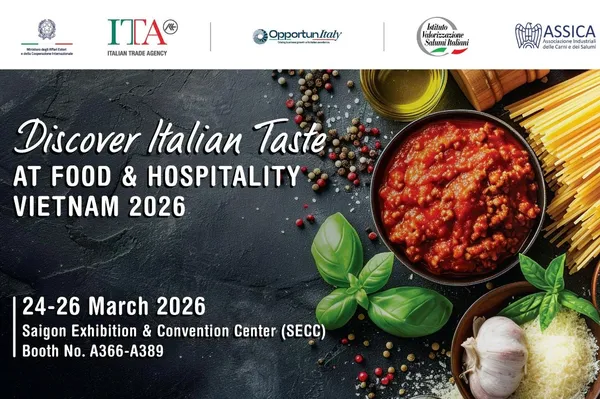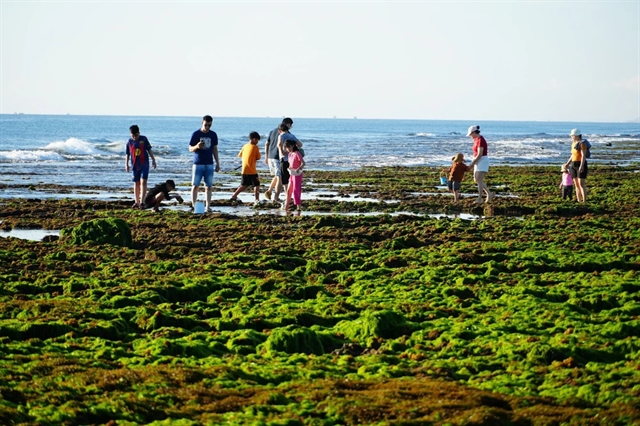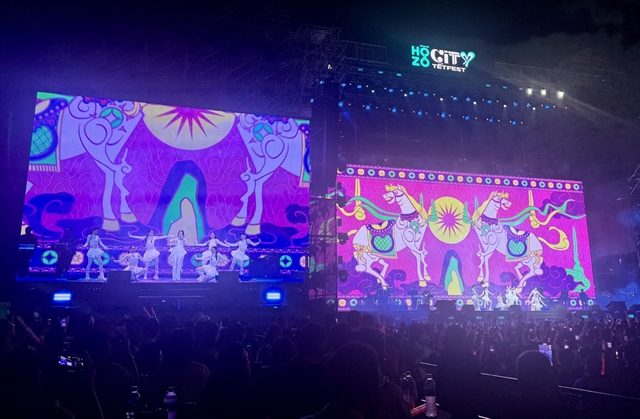 Features
Features

Vụn Art is a social enterprise specialising in crafting products from silk debris.
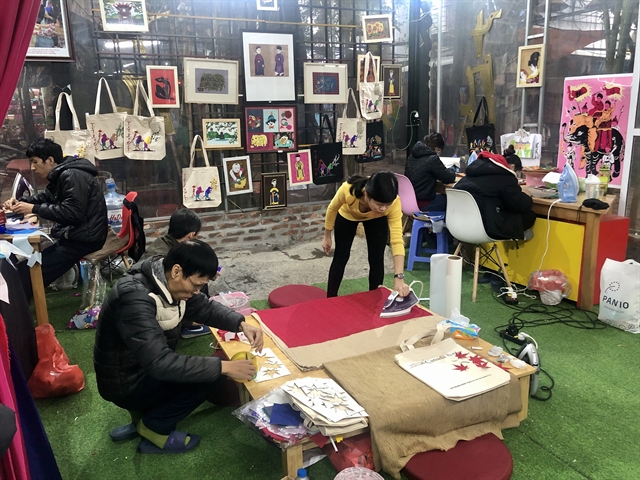
|
| Disadvantaged people seen in the workshop of Vụn Art – a local social enterprise specialising in crafting handmade products from silk debris. VNS Photo Thúy Hằng |
By Thúy Hằng
In a small 20-square-metre workshop, more than 10 disabled people of different ages painstakingly focus on their work – collaging scraps of silk cloth to create paintings and postcards.
They are employees of Vụn Art – a social enterprise specialising in crafting products from silk debris.
Located in the Centre of Silk Preservation in Vạn Phúc silk craft village in Hà Nội’s Hà Đông District, the business is the initiative of Lê Việt Cường, a polio sufferer.
Like many of his peers, years ago, Cường was frustrated when he couldn’t find a suitable job to look after himself and his family.
“Due to health conditions, disabled people are suitable for few jobs. It's also not easy to find those jobs as there aren't many of them,” he said.
Cường eventually found work and once his situation was stable, he wanted to do something meaningful for his peers, so in August 2018, he founded Vụn Art, which employs only disabled people.
To prepare to open the business, a year before the opening, Cường sent 30 disabled people to a vocational course to learn how to create paintings and postcards from leftover cloth. The course was conducted by painter Nguyễn Văn Trường, who, together with female artist Đặng Thị Khuê, became the art consultants of Vụn Art.
“Alongside the purpose of creating a job that is suitable for the health and physical conditions of disabled people, I wanted to utilise a material source that is available right here in this silk craft village,” Cường said.
According to him, using scraps not only helps reduce costs as all the tailor shops in the village offer them for free but also protects the environment by recycling waste.
Vụn Art also wants to promote Vietnamese traditional culture through their handmade products, so all their silk collage paintings are inspired by Việt Nam’s famous folk painting schools including Đông Hồ, Hàng Trống, Kim Hoàng, and Làng Sình.
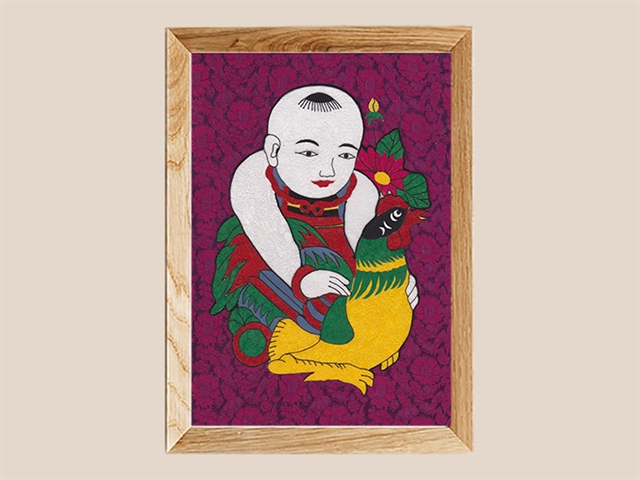
|
| A collage-based painting which takes inspiration from the Đông Hồ folk painting. Photo courtesy of Vụn Art |
In the first few months after the launch, the enterprise struggled when “we hadn't figured out yet which products could sell well in the market,” Cường said.
“In addition, the collaging skills of our employees at that time were not good enough to create sophisticated items.”
Day by day, the group of 14 people, led by their ‘captain’ Cường, have won the favour of customers and have received more and more orders.
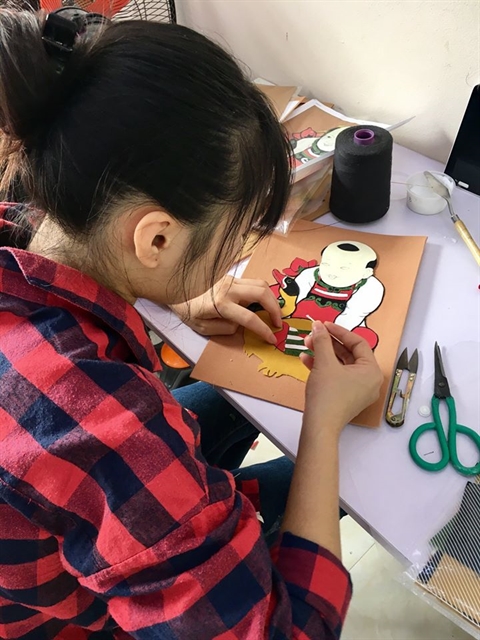
|
| A Vụn Art employee works on a silk collage-based painting. Photo courtesy of Vụn Art |
"Our products need to win customers with their quality. I don’t want customers to choose our products because they were made by disabled people. It will be great if the customers pick our products without thinking they are helping or supporting us. As otherwise, our products won't be able to find a place in the market,” Cường said.
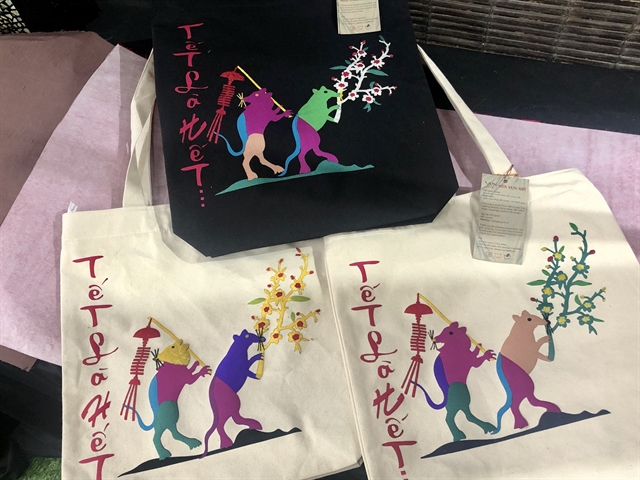
|
| Tote bags with collage-based patterns by Vụn Art for the up-coming Lunar Year of the Rat. VNS Photo Thúy Hằng |
The range of products by Vụn Art has expanded, from postcards and paintings in the beginning, to tote bags, T-shirts and hoodies, and DIY collaging sets now.
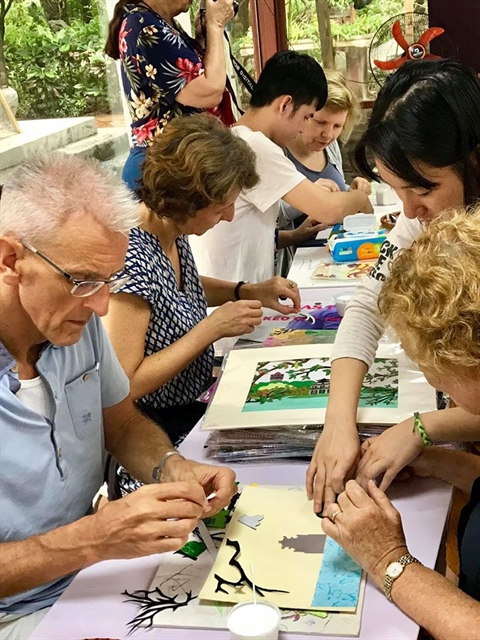
|
| Foreign tourists join a craft workshop hosted by Vụn Art. Photo courtesy of Vụn Art |
Vụn Art also has worked with tour companies to organise craft workshops for foreign tourists. Similar events have also been held for school students.
However, after more than a year, the young enterprise still faces many difficulties.
“At present, none of our employees has a monthly salary as we don’t have any stable outcome for our products yet. Instead, they get an allowance, which is paid out of the salary I earn from my job,” director Cường said.
“That’s why our biggest challenge is to find a stable outcome for our products,” he added.
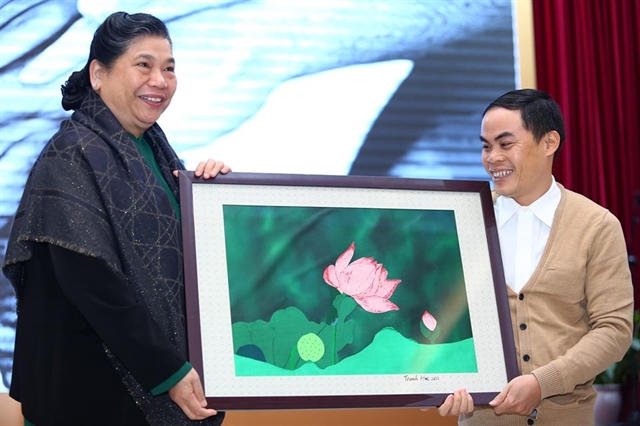
|
| Founder and director of Vụn Art Lê Việt Cường gives a collage-based painting to Việt Nam's National Assembly Vice Chairwoman Tòng Thị Phóng. Photo courtesy of Vụn Art |
Undeterred by these challenges, the director has continued to knock on the doors of many enterprises, international organisations and embassies to seek more orders.
Finding designs that can satisfy the market’s taste is also another challenge.
“We have to do almost everything by ourselves. We are lucky to have gold-hearted friends who are willing to give us a hand whenever we need help. They give us valuable advice on both designing and marketing,” Cường revealed.
According to the director, Vụn Art is in negotiations with two Vietnamese leading fashion brands, Canifa and Bò Sữa, to develop a range of clothing products with collage patterns.
“If we reach an agreement on developing this product line, it means more jobs will be created for my peers. My goal is that those people can earn stable incomes while working at home or at charity centres where they live,” he said.
The efforts of Vụn Art and its members have been recognised via several prizes that they won over the past year, including an Encouraging Prize at the Hà Nội Design Competition for Handicraft Products 2018, and the Most Favourite Vietnamese Product by Consumers 2018.
The social enterprise has also been praised by UNESCO Việt Nam and the Hà Nội People's Committee for creating jobs for vulnerable people. VNS

